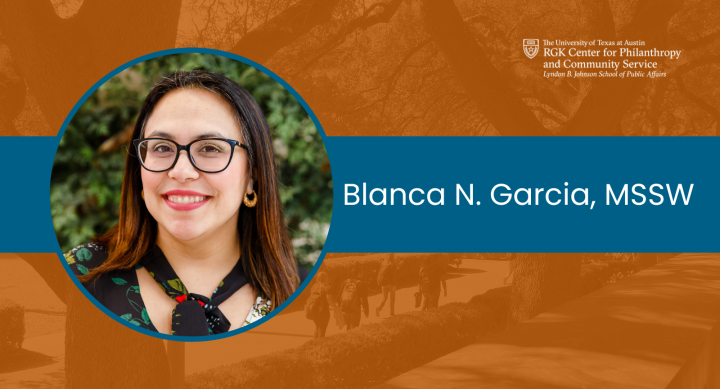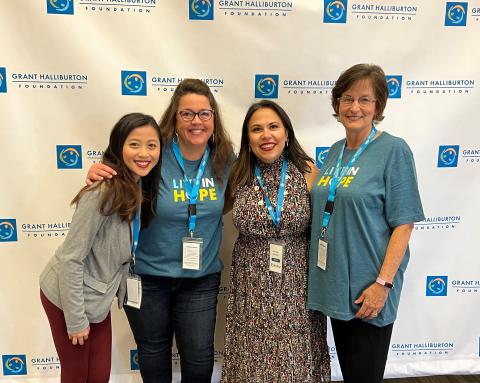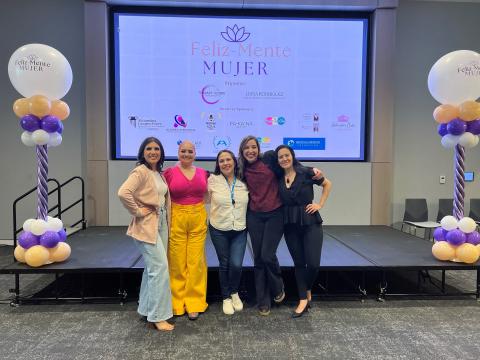
Blanca N. Garcia will tell you she did not mean to pursue mental health work as a career.
“I accidentally fell into it,” she laughs.
In graduate school at the Steve Hicks School of Social Work, Garcia was interested in working with nonprofits but was not a direct practice student. Instead, she envisioned working in a program management position and pursued the Community Administrative Leadership track (now called APP) to study social work practice on a macro level. After graduating, Garcia moved back home to Dallas and began working with students as an advisor in the Oak Cliff neighborhood where she grew up.
“I started working with children and adolescents and really fell in love with that from the beginning,” Garcia said. “I saw myself in these kids and wanted them to know how great they were."
At Texans Can Academies, Garcia worked with students who struggled in a traditional high school setting, providing emotional and academic support as well as in other areas, like accessing day care services for children of young parents. She quickly realized the effect that students’ experiences have on their mental health.
“I wish I knew then what I know now, that so much of their behavior was due to unresolved trauma,” Garcia said. “It’s a lot that these kids were going through, and we expect them to just live normally.”
Soon after graduating with her MSSW, Garcia earned her clinical license to allow her to provide direct mental health services to youth. She eventually shifted out of education, working first with Metrocare Services as a qualified mental health professional and then at Children’s Health as a behavioral health care manager.
When she came across an open position at Grant Halliburton Foundation, Garcia was drawn to their mission of strengthening mental health services for youth and preventing suicide. She thought of her friend in college who attempted suicide and who Garcia supported through the process of seeking medical help after the attempt. It was through this experience that Garcia first recognized the deep stigma around mental health and the difficulty of navigating emergency mental health situations, especially as a young adult.
“I could help other young people like her because when we were in college, we had no idea what to do,” Garcia said.
When she joined the Foundation as Director of Mental Health Resources in 2018, Garcia developed the Here For Texas Mental Health Navigation Line, connecting people to treatment options and guiding them through how to start seeking support. Since its official launch in 2019, the line has handled over 15,000 calls and resource requests. This year, the line has experienced a 40% increase in calls.
“There’s definitely a need for mental health and I think more people are trusting what we’re doing to guide them,” Garcia said. “My favorite part has been making sure that we follow up with every single person who calls.” The volunteers who staff the navigation line make at least three attempts to follow up with each caller to ensure they receive the information they need and are clear on next steps.

Another service that the Foundation provides is a free support group for mothers whose child is struggling with their mental health. Many of the mental health navigation line volunteers are mothers from these groups whose children have seen improvement and who now want to help other families find support.
In Summer 2022, the Foundation received a $300,000 Empowering Community grant from United Health Care to support their new Hispanic outreach initiative, led by Garcia.
“It was a passion of mine and I really want to focus on the Hispanic and Spanish-speaking communities,” said Garcia.
Since then, she has hired three additional Spanish-speaking social workers and has translated the Foundation’s mental health educational materials and presentations into Spanish. This fall, Garcia launched Charlas con un Cafecito, the Foundation’s first support group for Spanish-speaking mothers of children experiencing a mental health challenge.
“Our organization is doing good things in the community,” said Garcia. “This past year, we’ve been focusing on how to expand our impact, so the focus on Hispanic outreach has been really exciting for me.”

As a student in the Nonprofit Studies Portfolio program, Garcia learned how to develop nonprofit programs and assess their impact in the community and even took a class on volunteer management – all of which she uses in her current role at Grant Halliburton Foundation.
“Those portfolio classes very much gave me a foundation for what I’m doing now,” said Garcia. “This is what I had been wanting to do from the beginning, so it’s nice to see it all come full circle now.”
Garcia gained useful skills and knowledge from her classes as a graduate student, but also learned important lessons about the professional world. She was fired from her first internship, which she now recognizes as a “blessing in disguise” because when she shifted to an internship at a residential treatment center, she was exposed to the clinical mental health side of social work. From this experience, she learned an important lesson in advocating for herself and learning from her mistakes.
“There’s a reason that it didn’t work out and some of it is you, some of it is another person, or the system,” Garcia said. “Figure out what you did wrong, what you can do better next time, and don’t let that failure stop you.”
Garcia also learned the value of stepping outside of her comfort zone and getting to know people who may not have the same backgrounds or lived experiences she did.
“Take the time to figure out who you are and what makes you, you,” Garcia said. “If you’re around people that aren’t like you, get to know them too, because you’re going to have something in common.”
This is a skill she says she often uses with her clients or with colleagues in the workspace and one that she has recently recognized the value of.
“The older I’ve gotten, I realized that I had a lot of empathy for whoever I was working with and I think that also made me really good at what I was doing,” said Garcia. “It’s a strength I didn’t realize I had until I was further along into my career.”
If you are experiencing a mental health emergency, call the National Suicide Prevention Lifeline at 988. UT Austin students, faculty, and staff can call the CMHC 24/7 crisis help line at 512-471-2255.
If you or someone you know needs mental health resources, visit HereForTexas.com for a searchable database of North Texas providers. This free resource is also available in Spanish at HereForTexas.com/espanol. You can also call the Here For Texas Mental Health Navigation Line, a free helpline offering assistance finding providers and resources matching your needs. Call 972-525-8181 Monday–Friday 10 a.m. to 6 p.m. This is not a crisis line. Se habla español.